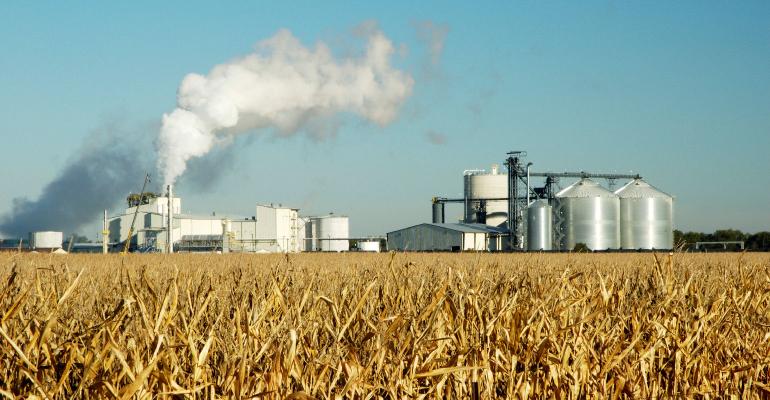
The coronavirus and cheap oil are hitting the fuel business so hard that ethanol plants are shutting down. Some may never come back.
The entire biofuel industry is facing a reckoning. Long before the pandemic emptied roads and exacerbated an oil price war, producers were battling chronic oversupply and trade upheaval. Now slumping demand and prices mean smaller producers and those with heavy debt loads will struggle to ride out the losses.
“When we come out of these two Black Swan events -- the price war in oil and now the coronavirus -- we will probably look differently as an industry,” said Todd Becker, chief executive officer of U.S. ethanol producer Green Plains Inc. “There are definitely plants out there that are going to run out of capital.”
Seen as a greener alternative to gasoline and once promoted as a way for countries to wean themselves off foreign oil, the industry is facing another crushing blow. Corn ethanol plants are closing across the U.S., Brazilian producers of sugar cane-based fuel are sinking further into debt and efforts to use more biofuel are being jeopardized in Asia. In Europe, producers are either cutting back or making feedstock for hand sanitizer.
U.S. gasoline hit a 20-year low and prices at the pump are already below $1 a gallon in some states. That’s on the back of an oil price war between Russia and Saudi Arabia that sent crude markets into meltdown and the virus outbreak that has upended demand.
While cheap fuel is good news for consumers, it’s hurting biofuel producers and American farmers, who sell about a third of their corn crops to the ethanol industry.
Valero Energy Corp., the No. 2 U.S. oil refiner, is temporarily closing two plants and won’t comply with some contracts. Andersons Inc. is suspending operations at its plants and POET has “temporarily ceased corn purchases at a number of locations.” Pacific Ethanol Inc. is cutting output by as much as 60%.
Storage squeeze
Producers are struggling to find storage as demand takes a dive. Three to four billion gallons of U.S. production could come offline in the next 30 days, according to Green Plains.
“At some point, your tanks are full and your railcars are full and you start filling up the coffee cups in the cafeteria,” said Monte Shaw, executive director of the Iowa Renewable Fuels Association. “Then, the plant shuts down.”
To be sure, fossil fuel makers are also getting hammered. But for the U.S. biofuel industry, the pandemic and dirt cheap oil are just the latest blows in a short but tumultuous history.
Archer-Daniels-Midland Co., the agribusiness giant that helped draw the blueprint for the U.S. biofuel industry, started producing ethanol in the late 1970s. But it wasn’t until the early 2000s, when then-President George W. Bush instituted a mandate for its use to reduce dependence on imported oil, that the industry exploded. Still, some plants went bankrupt after corn prices jumped around the time of the financial crisis.
Slower growth in gasoline demand in the last few years meant more U.S. supplies needed to be exported, but the top overseas growth market, China, all but stopped buying American supplies amid the trade dispute. That put plants on their heels, and they’ve never fully recovered.
While Beijing is returning to the U.S. agriculture market after the phase-one deal, picking up a few cargoes of corn, that won’t be enough to offset the pain caused by the drop in ethanol production.

CROP DEMAND: Collapse of ethanol demand is weighing on corn prices as the market works through COVID-19 issues.

The corn market gets “too excited about a few corn cargoes to China but they are missing the fact that a structural demand destruction is going on right now,” Becker said. “That’s a fundamental risk to agriculture today.”
The industry could be further threatened by a move by the U.S. Environmental Protection Agency that could extend biofuel blending exemptions for small refineries.
The picture is similarly bleak in Brazil, where millers are struggling with lower prices for both sugar and ethanol. The sector is drowning in dollar-denominated debt as the Brazilian real sank to a record low.
Even before the virus sent Brazilian fuel consumption tumbling more than 50% in a week, the sector had already been hit by a financial “hurricane,” said Alexandre Figliolino, partner at MB Agro. More than 50 mills closed since 2011 and 70-plus have filed for bankruptcy protection.
In Europe, where more than 70% of rapeseed oil is used to make biodiesel, uncertainty about the future of blending demand is causing problems for suppliers, researcher F.O. Licht said in a report. Brussels-based Alcogroup said last week it was reducing ethanol production by 30%. While there’s very high demand for industrial grade ethanol, the fuel market continues “spiraling down,” F.O. Licht said.
In Asia, palm oil prices hit the highest premium to diesel in years, a spike that will probably jeopardize efforts by Indonesia and Malaysia to use more biofuel at home.
It will still be a while before economies recover from the virus. In the U.S., a resurgence probably will bring back ethanol demand in the fourth quarter, said Dan Kowalski, vice president of research at CoBank, a $145 billion lender to the agriculture industry.
“We expect ethanol plants to continue to shut down capacity,” Kowalski said. “Until we see gasoline prices come back and bringing the ethanol prices back, the ethanol situation is going to remain pretty severe.”
--With assistance from Millie Munshi.
To contact the reporters on this story: Isis Almeida in Chicago at [email protected]; Fabiana Batista in Sao Paulo at [email protected]; Michael Hirtzer in Chicago at [email protected]
To contact the editors responsible for this story: Lynn Doan at [email protected], James Attwood, Joe Richter
© 2020 Bloomberg L.P.
About the Author(s)
You May Also Like




